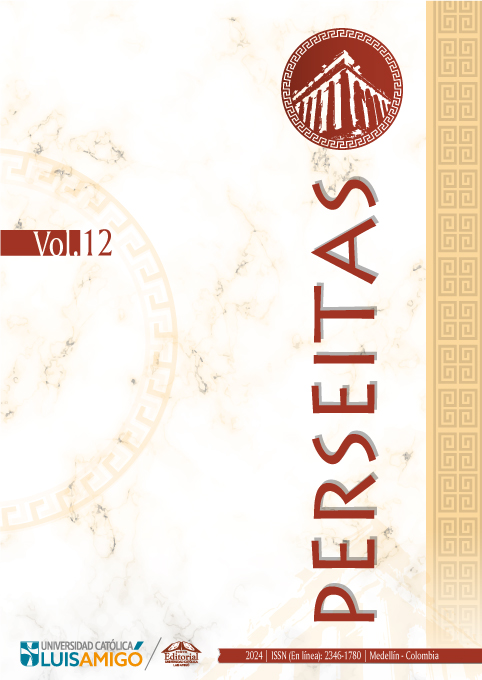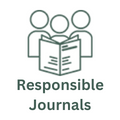Radicality and banality: the "bourgeois" as the core of Arendt's reflection on evil
DOI:
https://doi.org/10.21501/23461780.4781Keywords:
Arendt, Banality of evil, Bourgeois, Citizen, Politics, Radical evilAbstract
This article tries to develop a reconsideration of the notions of "radical evil" and "banality of evil" emphasizing Arendt's reflection on the figure of the "bourgeois". In this sense, the main consonances and differences between both concepts are brought to the forefront trying to point out their common theoretical origin. As a result, the work confirms, after careful argumentation, the central weight that Arendt's multifaceted analysis of the bourgeois has on the conformation of her reflections on evil, both in the early period and in the later facet of her work.
Downloads
References
Arendt, H. (1962). The Origins of Totalitarianism [Los orígenes del totalitarismo]. Second Edition. Meridian Books.
Arendt, H. (1969). Between Past and Future. Eight Exercises in Political Thought [Entre el pasado y el futuro. Ocho ensayos sobre pensamiento político]. The Viking Press.
Arendt, H. (1990). On Revolution [Sobre la revolución]. Penguin Books.
Arendt, H. (1992). Hannah Arendt-Karl Jaspers Correspondence (1926-1969) [Correspondencia Hannah Arendt-Karl Jaspers]. A Harvest Book–Harcourt Brace & Company.
Arendt, H. (1994). Essays in Understanding 1930-1954 [Ensayos de comprensión 1930-1954]. Schocken Books.
Arendt, H. (1995). De la historia a la acción. Ediciones Paidós.
Arendt, H. (1995). Between Friends The Correspondence of Hannah Arendt and Mary McCarthy (1949-1975) [Entre amigas. Correspondencia entre Hannah Arendt y Mary McCarthy (1949-1975)]. Harcourt Brace & Company.
Arendt, H. (1998). The Human Condition [La condición humana]. University of Chicago Press.
Arendt, H. (2006). Eichmann in Jerusalem. A Report in the Banality of Evil [Eichmann en Jerusalén: Un estudio sobre la banalidad del mal]. Penguin Books.
Arendt, H. (2007). The Jewish Writings [Escritos judíos]. Schocken Books.
Arendt, H. (2010). “Estado nacional y democracia”, en Arbor. Ciencia, Pensamiento y Cultura. 186(742), 191-194.
Benhabib, S. (2000). Arendt´s Eichmann in Jerusalem [Eichmann en Jerusalén de Arendt]. En The Cambridge Companion to Hannah Arendt. Villa, D. (Editor). Cambridge University Press.
Bernstein, R. (1996). Did Hannah Arendt Change Her Mind? From Radical Evil to the Banality of Evil [¿Hannah Arendt cambió de opinión? Del mal radical a la banalidad del mal]. en Hannah Arendt: Twenty Years Later. May, L y Kohn, J. (Eds.). The MIT Press.
Bernstein, R. (2002). Radical Evil. A Philosophical Interrogation [Mal radical. Un interrogatorio filosófico]. Polity Press.
Bernstein, R. (2010). Are Arendt's Reflections on Evil Still Relevant? [¿Siguen siendo relevantes las reflexiones de Arendt sobre el mal?]. En Politics in Dark Times. Encounters with Hannah Arendt, Benhabib, S. (Editor). Cambridge University Press.
Busk, L. (2023). What is “Totalitarian” Today? Arendt after the Climate Breakdown [¿Qué es “totalitario” hoy? Arendt después del colapso climático]. Philosophy Today, 67(1). https://doi.org/10.5840/philtoday2023131466
Canovan, M. (1992). Hannah Arendt. A Reinterpretation of her Political Thought [Hannah Arendt. Una reinterpretación de su pensamiento político]. Cambridge University Press.
Correia, A. (2022). Acumulação ilimitada e a política como mera força: Hannah Arendt sobre imperialismo e capitalismo [Acumulación ilimitada y política como mera fuerza: Hannah Arendt sobre el imperialismo y el capitalismo]. Cadernos Arendt, 2(3), 92-97. https://periodicos.ufpi.br/index.php/ca/article/view/2051/1872
Dickson, J. (2023). The Politics of the Soul. From Nietzsche to Arendt [La política del alma. De Nietzsche a Arendt]. Routledge.
Evron, N. (2021). Hannah Arendt, Thinking, Metaphor [Hannah Arendt, Pensamiento, Metáfora]. Telos, 196 (Fall 2021), 9-30.
Formosa, P. (2007). Is radical evil banal? Is banal evil radical? [¿Es banal el mal radical? ¿Es radical el mal banal?] Philosophy & Social Criticism, 33(6), 717-735. https://doi.org/10.1177/0191453707080585
Gomes Barbosa, G. (2009). Imperialismo, Capitalismo e burguesía Revisitando as contribuições teóricas de Joseph Schumpeter e Hannah Arendt [Imperialismo, capitalismo y burguesía Revisando los aportes teóricos de Joseph Schumpeter y Hannah Arendt]. Colombia Internacional, (70), 146-165.
Goyenechea, E. (2012). Hannah Arendt y Walter Benjamin: masa, multitud, populacho. Colección, (22), 115-146. https://erevistas.uca.edu.ar/index.php/COLEC/article/view/861/828
Hiruta, K. (2019). Hannah Arendt, liberalismo y libertad frente a la política. En: K. Hiruta (Ed.), Arendt sobre libertad, liberación y revolución. Filósofos en profundidad. Palgrave Macmillan, Cham. https://doi.org/10.1007/978-3-030-11695-8_2
Hobbes, T. (2003). Leviathan [Leviatán]. Cambridge University Press
Kateb, G. (2010). Existential Values in Arendt's Treatment of Evil and Morality [Valores existenciales en el tratamiento del mal y la moralidad de Arendt]. en Politics in Dark Times. Encounters with Hannah Arendt, Benhabib, S. (Ed.). Cambridge University Press.
Kohn, J. (1996). Evil and Plurality: Hannah Arendt’s Way to The Life of the Mind, I [Mal y pluralidad: el camino de Hannah Arendt hacia la vida de la mente, I]. en Hannah Arendt: Twenty Years Later. May, L y Kohn, J. (Eds.). The MIT Press.
Lawtoo, N. (2021). The Case of Eichmann Restaged: Arendt, Evil, and the Complexity of Mimesis [El caso de Eichmann reescenificado: Arendt, el mal y la complejidad de la mímesis]. Political Research Quarterly, 74(2), 479-490. https://doi.org/10.1177/1065912920911201
Lederman, S. (2019). The Radicalism of the Banality of Evil: Ideology and Political Conformity in Arendt [El radicalismo de la banalidad del mal: ideología y conformidad política en Arendt]. New German Critique, 46(2(137)), 197-220.https://doi.org/10.1215/0094033X-7546248
Lilia, M. (19 de diciembre de 2013). Arendt & Eichmann: The New Truth [Arendt y Eichmann: la nueva verdad] [Cartas al editor]. The New York Review.
Machado, L. (2021). Ideologia e algoritmos: uma análise a partir do conceito de ideologia em Arendt [Ideología y algoritmos: un análisis a partir del concepto de ideología de Arendt]. Logos & Culturas: Revista Acadêmica Multidisciplinar de Iniciação Científica, 1(2), 62-80. https://ojs.catolicadefortaleza.edu.br/index.php/logosculturas/article/view/171/339
Mantena, K. (2010). Genealogies of Catastrophe: Arendt on the Logic and Legacy of Imperialism [Genealogías de la catástrofe: Arendt sobre la lógica y el legado del imperialismo]. En S. Benhabib (Ed.), Politics in Dark Times. Encounters with Hannah Arendt (pp. 83-112). Cambridge University Press.
Maquiavelo, N. (2005). Discursos sobre la primera década de Tito Livio. Alianza.
Montaigne, M. (2014). Ensayos. Debolsillo.
Montesquieu. (1995). De l'esprit des lois [El espíritu de las leyes]. Gallimard.
Neiman, S. (2010). Banality Reconsidered [Banalidad reconsiderada]. En S. Benhabib (Ed.), Politics in Dark Times. Encounters with Hannah Arendt (pp. 305-315). Cambridge University Press.
Rousseau, J. J. (2001). Du Contrat Cocial ou Principes du Droit Politique [El Contrato Social o Principios del Derecho Político]. Mozambook.
Schubart, E. (2021). Observations from the Eichmann Trial: The Democratic Necessity of Deliberation and Cognitive Diversity [Observaciones del juicio de Eichmann: la necesidad democrática de la deliberación y la diversidad cognitiva]. North Carolina Journal of European Studies, 2. https://doi.org/10.17615/bxsv-7e75
Shymko, Y., & Frémeaux, S. (2022). Escaping the Fantasy Land of Freedom [Escapar de la tierra de fantasía de la libertad]. Organizations: The Contribution of Hannah Arendt. J Bus Ethic, 176, 213-226. https://doi.org/10.1007/s10551-020-04707-x
Silva Uchôa M. (2022). O imperialismo e o colonialismo nas origens do totalitarismo” [Imperialismo y colonialismo en los orígenes del totalitarismo]. Cadernos Arendt, 2(3), 18-41.
Wagon, M. E. (2015) Arendt y el totalitarismo. Consideraciones sobre la radicalidad y la banalidad del mal. en V Jornadas de investigación en Humanidades. Noviembre, 2013. Bahía Blanca, Argentina.
Wagon, M. E. (2020). La dimensión política del mal radical y de la banalidad del mal en el pensamiento de Hannah Arendt. Cuadernos Filosóficos/Segunda Época, (16), 2-24. https://doi.org/10.35305/cf2.vi16.62
Wiley, J. (2016). Politics and the Concept of the Political. The Political Imagination [La política y el concepto de lo político. La imaginación política]. Routledge.
Published
How to Cite
Issue
Section
License

This work is licensed under a Creative Commons Attribution-NonCommercial-NoDerivatives 4.0 International License.
La revista y los textos individuales que en esta se divulgan están protegidos por las leyes de copyright y por los términos y condiciones de la Licencia Creative Commons Atribución-No Comercial-Sin Derivar 4.0 Internacional.
















